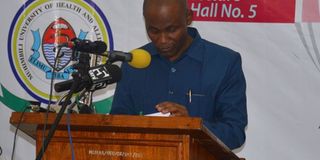Minister challenges MUHAS over research works

Health deputy minister, Dr Faustine Ndugulile
What you need to know:
- Minister challenges Muhas to come up with appropriate health research works that are aligned with the country's health sector settings
Dar es Salaam. Health deputy minister, Dr Faustine Ndugulile, has challenged the Muhimbili University of Health and Allied Sciences (Muhas) to conduct a comprehensive solution-based health research work that aligns with the country's health sector settings.
He mentioned HIV, Tuberculosis, Hepatitis B, among others, as the health sector' key areas of interventions.
Dr Ndugulile made the remarks following his revelations that majority of the country's researchers were receiving funds from donors and embarking on research works that did not have a positive impact on the country's health settings.
"I encourage you to select wisely when conducting researches. The research works must be aligned with the country's health settings in addressing common health challenges," he urged.
"I also encourage other higher learning institutions to engage in generating evidence-based research works that would help in addressing socioeconomic challenges and foster economic growth," he appealed.
The deputy minister made the remarks when he addressed participants during the launch of Muhas' symposium dubbed "Programme For University Wide Research Dissemination" that focuses on disseminating various solution-based health research works to address health challenges.
On Wednesday Muhas organised the first health event under the theme "Comprehensive Management to People Addicted to Heroin. Implication for Programs and Policy," which brought together researchers to discuss various measures to curb drugs use in Tanzania.
During the event, Dr Ndugulile called on the university to prepare a summary of the university's disseminated research works on drugs and submit it to the relevant health ministry. He noted that the government would incorporate the findings into the national programmes.
Speaking shortly after the launch of the symposium, Muhas' Vice Chancellor, Prof Andrea Pembe, briefed journalists that the aim was to complement the country's efforts to curb illicit drugs use among the population.
"I commend the government for establishing methadone clinics that offer treatment for people addicted to heroin," he said.
Presenting one of the university's latest research works on drugs use during the symposium, Muhas' Psychiatrist, Dr Jessie Mbwambo, asserted that the doubling of efforts was necessary to incorporate the disseminated drugs addiction management methodologies into the national programmes, saying the methodologies were crucial to mitigating drugs use.
Among others, the university's latest research work, dubbed "Addressing the Micro-and Macro-Environmental Vulnerabilities to HIV of people Who Inject Drugs in Tanzania-2018" indicates that there are 30, 000 people who inject drugs in Mainland Tanzania, with an approximate HIV prevalence of 35 per cent in such a key population.
To address drug use prevalence in Tanzania, in February, 2011, a cutting-edge medication assisted treatment (MAT) clinic for opioid addiction, offering methadone maintenance treatment was established at the Muhimbili National Hospital (MNH)in Dar es Salaam.



